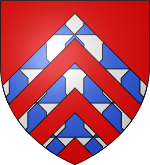Pierre d'Amiens
Pierre d'Amiens († summer 1204 in Philippi ) was a French knight of the fourth crusade . He was a son of the castellan Dreux von Amiens and the Marguerite de Saint-Pol. After the death of his father, he inherited the castles of Vignacourt and Flixecourt (now in the Somme department ) in addition to the Amiens castellan .
Together with his maternal cousin, Count Hugo IV of Saint-Pol , Pierre d'Amiens took the cross for the fourth crusade in the spring of 1200. Apparently after the conquest of Zara (1202) he had doubts about the diversion of the crusade to Constantinople . Villehardouin reports that on Corfu several knights, including Pierre d'Amiens, announced their intention to separate from the army in order to fight Count Walter III. from Brienne in southern Italy. Already at Zara a large group around Simon de Montfort had left the army to go to Syria on their own. The leading crusade leaders, however, were able to persuade the knights willing to desert to stay, arguing that a further weakening of personnel would impair the chances of victory of the thinned army in the anticipated battle for Constantinople. They also appealed to the knights' honor not to break their crusade oath and abandon their comrades. Changed by this, the deviants, together with the rest of the army, invoked their continued unity and loyalty to the cause on holy relics.
During the first siege of Constantinople (July 1203), Pierre d'Amiens and the Count of Saint-Pol took command of one of the attack lines of the crusaders. The chronicler and knight Robert de Clari described his outstanding bravery and commitment. Robert de Clari was a vassal of Pierre d'Amiens and accompanied him on the crusade together with his brother, the monk Alleaume de Clari. During the second decisive storming of the city (April 1204), Robert de Clari described his master's heroic deed after the attack stagnated after taking two towers due to strong resistance. Then Pierre d'Amiens took the initiative and with a group of knights and sergeants, including the Clari brothers, conquered the walls of Constantinople and opened one of the gates through which the crusaders could penetrate the city and thus seal the fall of Constantinople . Villehardouin did not mention this act, possibly because Pierre d'Amiens had made himself unpopular with him as one of the rebels of Corfu.
After the conquest of Constantinople, Pierre d'Amiens belonged to the entourage of the first Latin emperor Baldwin I , whom he accompanied during the conquest of Thessalonike in the summer of 1204. Shortly afterwards, an epidemic struck the army from which, among others, Pierre d'Amiens fell ill. According to de Clari, he died in the city of Philippi , where Alexander the Great was once born.
literature
- Robert de Clari : La Conquête de Constantinople ed. Philippe Lauer , 1924
Web link
| personal data | |
|---|---|
| SURNAME | Pierre d'Amiens |
| ALTERNATIVE NAMES | Peter of Amiens |
| BRIEF DESCRIPTION | Castellan of Amiens, Lord of Vignacourt and Flexicourt, crusaders |
| DATE OF BIRTH | 12th Century |
| DATE OF DEATH | 1204 |
| Place of death | Philippi |
